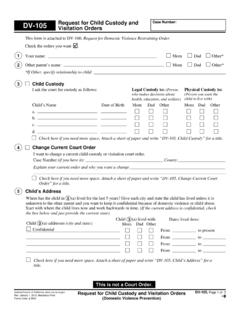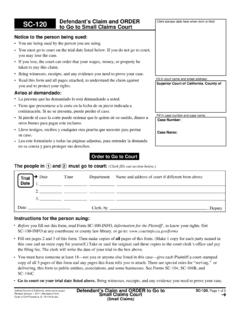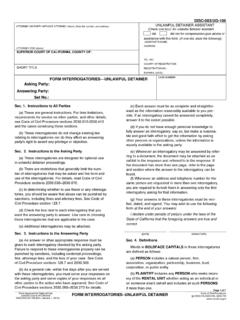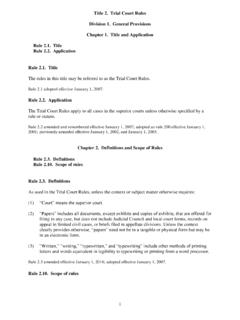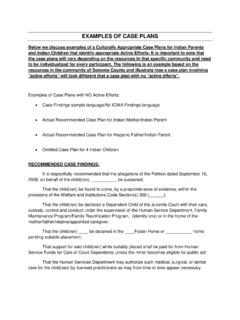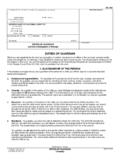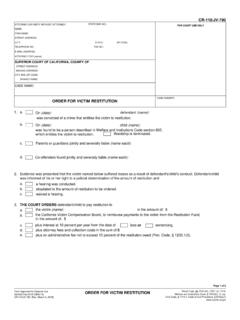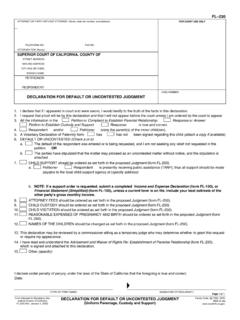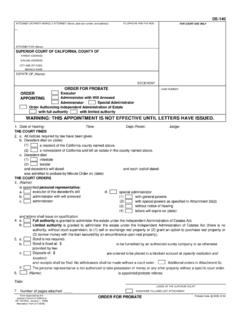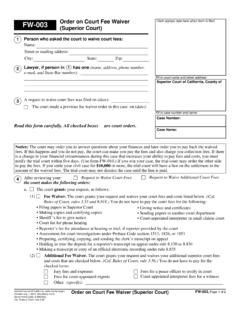Transcription of INITIAL INSPECTION BEFORE TENANT MOVES OUT
1 INITIAL INSPECTION BEFORE TENANT MOVES OUT (Civil Code (f)) A TENANT can ask the landlord to inspect the rental unit BEFORE the tenancy ends. During this INITIAL INSPECTION , the landlord or the landlord s agent identifies defects or conditions that justify deductions from the TENANT s security deposit. This gives the TENANT the opportunity to do the identified cleaning or repairs in order to avoid deductions from the security deposit. The TENANT has the right to be present during the INSPECTION . The landlord must perform an INITIAL INSPECTION as described here if the TENANT requests it, but cannot make an INITIAL INSPECTION unless the TENANT requests it.
2 However, the landlord is not required to perform an INITIAL INSPECTION if the landlord has served the TENANT with a three-day notice (an eviction notice) for one of the reasons specified in endnote Landlord s notice The landlord must give the TENANT written notice of the TENANT s right to request an INITIAL INSPECTION of the rental and to be present during the INSPECTION . The landlord must give this notice to the TENANT a reasonable time after either the landlord or the TENANT has given the other written notice of intent to terminate (end) the tenancy. If the TENANT has a lease, the landlord must give the TENANT this notice a reasonable time BEFORE the lease ends.
3 If the TENANT does not request an INITIAL INSPECTION , the landlord does not have any other duties with respect to the INITIAL Scheduling the INSPECTION When the TENANT requests an INITIAL INSPECTION , the landlord and the TENANT must try to agree on a mutually convenient date and time for the INSPECTION . The INSPECTION cannot be scheduled earlier than two weeks BEFORE the end of the tenancy or lease term. In any event, the INSPECTION should be scheduled to allow the TENANT ample time to perform repairs or do cleaning identified during the INITIAL The landlord must give the TENANT at least 48 hours advance written notice of the date and time of the INSPECTION whether or not the parties have agreed to a date and time for the INSPECTION .
4 The landlord is not required to give the 48-hour notice to the TENANT if: the parties have not agreed on a date and time, and the TENANT no longer wants the INSPECTION ; or the landlord and TENANT have agreed in writing to waive (give up) the 48-hour notice requirement. Itemized statement The landlord or the landlord s agent may perform the INSPECTION if the TENANT is not present, unless the TENANT has previously withdrawn the request for Based on the INSPECTION , the landlord or agent must prepare an itemized statement of repairs or cleaning that the landlord or agent believes the TENANT should perform in order to avoid deductions from the TENANT s security deposit.
5 The landlord or agent must give the statement to the TENANT if the TENANT is present for the INSPECTION , or leave it inside the unit if the TENANT is not The landlord or agent also must give the TENANT a copy of the sections of California s security deposit statute that list lawful uses of tenants security deposits. 6 The security deposit statute has the effect of limiting the kinds of repairs or cleaning that the landlord or agent may properly include in the itemized statement. Because of this statute, the landlord cannot, for example, use the TENANT s security deposit to repair damages or correct defects in the rental that existed when the TENANT moved in or that are the result of ordinary wear and Since the landlord cannot use the TENANT s deposit to correct these kinds of defects, the landlord or agent cannot list them in the itemized statement.
6 BEFORE the tenancy ends, the TENANT may make the repairs or do the cleaning described in the itemized statement, as allowed by the rental agreement, in order to avoid deductions from the However, the TENANT cannot be required to repair defects or do cleaning if the TENANT s security deposit could not be used properly to pay for that repair or cleaning . Final INSPECTION The landlord may perform a final INSPECTION after the TENANT has moved out of the rental unit. The landlord may make a deduction from the TENANT s security deposit to repair a defect or correct a condition: that was identified in the INSPECTION statement and that the TENANT did not repair or correct; or, that occurred after the INITIAL INSPECTION .
7 Or that was not identified during the INITIAL INSPECTION due to the presence of the TENANT s Any deduction must be reasonable in amount, and must be for a purpose permitted by the security deposit Twenty-one calendar days (or less) after the tenancy ends, the landlord must refund any portion of the security deposit that remains after the landlord has made any lawful Example Suppose that you have a month-to-month tenancy, and that you properly give your landlord 30 days advance written notice that you will end the tenancy. A few days after the landlord receives your notice, the landlord gives you written notice that you may request an INITIAL INSPECTION and be present during the INSPECTION .
8 A few days after that, the landlord telephones you, and you both agree that the landlord will perform the INITIAL INSPECTION at noon on the fourteenth day BEFORE the end of the tenancy. Forty-eight hours BEFORE the date and time that you - 2 -have agreed upon, the landlord gives you a written notice confirming the date and time of the INSPECTION . The landlord performs the INITIAL INSPECTION at the agreed time and date, and you are present during the INSPECTION . Suppose that you have already moved some of your possessions, but that your sofa remains against the living room wall. When the landlord completes the INSPECTION , the landlord gives you an itemized statement that lists the following items, and also gives you a copy of the required sections of the security deposit statute.
9 The itemized statement lists the following: Repair cigarette burns on window sill. Repair worn carpet in front of couch. Repair door jamb chewed by your dog. Wash the windows. Clean soap scum in bathtub. Suppose that you scrub the bathtub until it sparkles, but don t do any of the repairs or wash the windows. After you move out, the landlord performs the final INSPECTION . Twenty-one days after the tenancy ends, the landlord sends you an itemized statement of deductions, along with a refund of the rest of your security deposit. Suppose that the itemized statement lists deductions from your security deposit for the costs of repairing the window sill, the carpet and the door jamb, and for washing the windows.
10 Has the landlord acted properly? Whether the landlord has acted properly depends on other facts. Suppose that the cigarette burns were caused by a previous TENANT and that the carpet in the room with the couch was 10 years old. According to the security deposit statute, the cigarette burns are defective conditions from another tenancy, and the worn carpet is normal wear and tear, even if some of it occurred while you were a TENANT . The statute does not allow the landlord to deduct from your security deposit to make these However, the landlord can deduct a reasonable amount to repair the door jamb chewed by your dog.
